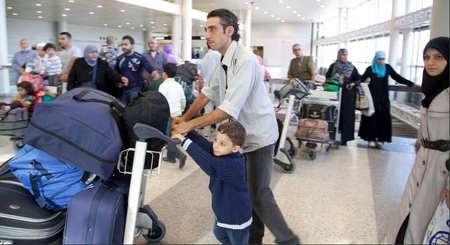|
Please take a moment to visit and log in at the subscriber area, and
submit your city & country location. We will use this information in
future to invite you to any events that we organize in your area.
Let Refugees Remain in Their Own Culture Zones
WT title: "A common culture for
refugees"]
The lull in the chemical weapon crisis offers a chance to divert attention
to the huge flow of refugees leaving Syria and rethink some misguided
assumptions about their future.About one-tenth of Syria's 22 million residents have fled across an international border, mostly to neighboring Lebanon, Jordan, and Turkey. Unable to cope, their governments are restricting entry, prompting international concern about the Syrians' plight. The United Nations High Commissioner for Refugees, António Guterres, suggests that his agency (as the Guardian paraphrases him) "look to resettle tens of thousands of Syrian refugees in countries better able to afford to host them," recalling the post-2003 Iraqi resettlement program, when 100,000 Iraqis resettled in the West. Others also look instinctively to the West for a solution; the U.S. Conference of Catholic Bishops, for example, has called on Western states "to do more" for Syrian refugees.
But these numbers pale beside a population numbering in the millions, meaning that the West alone cannot solve the Syrian refugee problem. Further, many in Western countries (especially European ones such as the Netherlands and Switzerland) have wearied of taking in Muslim peoples who do not assimilate but instead seek to replace Western mores with the Islamic law code, the Shari'a. Both German chancellor Angela Merkel and British prime minister David Cameron have deemed multiculturalism, with its insistence on the equal value of all civilizations, a failure. Worse, fascist movements such as the Golden Dawn in Greece are growing. And many more Muslim refugees are likely on their way. In addition to Syrians, these include Bangladeshis, Pakistanis, Afghans, Iranians, Iraqis, Lebanese, Palestinians, Egyptians, Somalis, and Algerians. Other nationals – for example, Yemenis and Tunisians – might soon join their ranks. Happily, a solution lies at hand. To place Syrians in "countries better able to afford to host them," as Guterres delicately puts it, one need simply divert attention from the Christian-majority West toward the vast, empty expanses of the fabulously wealthy Kingdom of Saudi Arabia, as well as the smaller but in some cases even richer states of Kuwait, Bahrain, Qatar, and the United Arab Emirates. For starters, these countries (which I will collectively call Arabia) are much more convenient to repatriate to Syria from than, say, New Zealand. Living there also means not enduring frozen climes (as in Sweden) or learning difficult languages spoken by few, such as Danish. More importantly, Muslims of Arabia share deep religious ties with their Syrian brothers and sisters, so settling there avoids the strains of life in the West. Consider some of the haram (forbidden) elements that Muslim refugees avoid by living in Arabia:
UN take note: Focus less on the West, more on the rest. As for Saudis: It's time to welcome Muslim coreligionists under stress with open arms. Mr. Pipes (DanielPipes.org) is president of the Middle East Forum. © 2013 by Daniel Pipes. All rights reserved. Sep. 24, 2013 addenda: (1) I am quite aware that the Saudis and others have no intention of allowing in Syrian or other refugees; that is the implicit premise of my analysis; why should they be rewarded for bad behavior? I am also aware that Syrian refugees have been maltreated in Middle Eastern countries; for example, they have become a handy scapegoat in Egypt. (2) These broad cultural zones are provisional; their boundaries would need to be worked out. (3) Exceptions to these cultural zones exist. Middle East Christians, for instance, fit better in the West than in Arabia; and exceptional individuals always deserve special consideration. (4) Some Middle Eastern economic refugees have discovered China and an increasing number go there on one- to five-year renewable residence permits.
Related
Topics: Immigration, Syria, US policy This
text may be reposted or forwarded so long as it is presented as an integral
whole with complete and accurate information provided about its author, date,
place of publication, and original URL.
|
||||||||
|
To subscribe to this list, go to http://www.danielpipes.org/list_subscribe.php
Sign up for related (but non-duplicating)
e-mail services:
Middle East Forum (articles and event reports) Campus Watch (articles, blog posts) Islamist Watch (articles, blog posts) Legal Project (articles, blog posts) at http://www.danielpipes.org/list_subscribe.php |
Tuesday, September 24, 2013
#1288 Pipes in Wash. Times with a fresh idea on the refugee problem
Subscribe to:
Post Comments (Atom)










































No comments:
Post a Comment